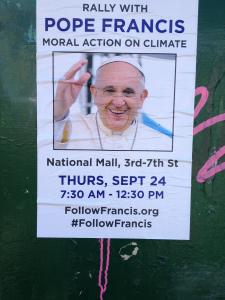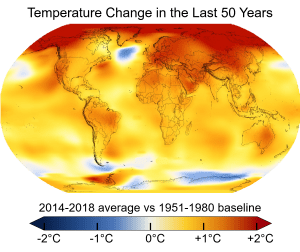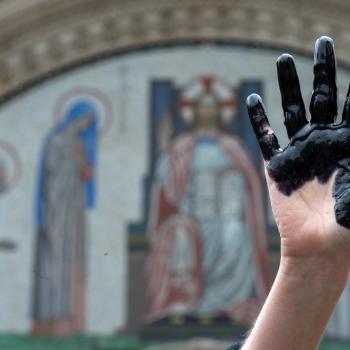
In May of 2015, Pope Francis released what could be the central encyclical of his papacy, Laudato si’. In it, he explained the great need for humanity to come together and deal with the environmental crisis which is before us today. “The urgent challenge to protect our common home includes a concern to bring the whole human family together to seek a sustainable and integral development, for we know that things can change.”[1] Everyone needs to be involved, because everyone will be affected. But, as Pope Francis knew, many people, many corrupt politicians and business leaders, and indeed, many so-called Christians, have not only tantrums when they have heard they have to work for the common good, they have actually done all they can to impede it:
We need a conversation which includes everyone, since the environmental challenge we are undergoing, and its human roots, concern and affect us all. The worldwide ecological movement has already made considerable progress and led to the establishment of numerous organizations committed to raising awareness of these challenges. Regrettably, many efforts to seek concrete solutions to the environmental crisis have proved ineffective, not only because of powerful opposition but also because of a more general lack of interest. Obstructionist attitudes, even on the part of believers, can range from denial of the problem to indifference, nonchalant resignation or blind confidence in technical solutions. We require a new and universal solidarity. [2]
Everyone will be affected, but it is clear, those who are poor or powerless, those who are in economically or technologically disadvantaged regions of the earth, will be more adversely affected by climate change: “Climate change is a global problem with grave implications: environmental, social, economic, political and for the distribution of goods. It represents one of the principal challenges facing humanity in our day. Its worst impact will probably be felt by developing countries in coming decades.” [3] This is one of the many reasons why the Amazon Synod was called, for those living in the Amazon region, especially those of an indigenous background, suffer at the hands of those who deny climate change and who recklessly go into the Amazon region destroying its natural resources. The words of the prophet Isaiah are as relevant to us today as they were in the original context in which they were spoken:
The earth mourns and withers, the world languishes and withers; the heavens languish together with the earth. The earth lies polluted under its inhabitants; for they have transgressed the laws, violated the statutes, broken the everlasting covenant. Therefore a curse devours the earth, and its inhabitants suffer for their guilt; therefore the inhabitants of the earth are scorched, and few men are left (Isa. 24:4-6 RSV).
More and more research warns of the devastation which lies before us if we do not come together for the common good and do what we can to fix the environment. It’s been reported that by 2050, hundreds of millions will be affected by the rising sea levels, which means that the destruction wrought by melting ice will be far greater than previously thought. By 2100, the likely impact on India will be enormous:
Released at an event in Delhi yesterday (Oct. 31), the report by the Climate Impact Lab in collaboration with the Tata Centre for Development at UChicago estimates that by 2100, around 1.5 million more people could die in India each year due to climate change.[4]
It’s not just the future. It is what lies before us now. In Africa, millions of people are already suffering from the effects of climate change. “More than 52 million people in 18 countries across southern, eastern and central Africa are facing up to crisis levels of hunger as a result of weather extremes, compounded by poverty and conflict.”[5] Likewise, millions living around the Aral Sea see firsthand what many of us will see in the future, because the sea itself is being destroyed:
The Aral Sea was once the world’s fourth largest inland lake. Today, it’s the epitome of environmental malpractice.
More than 60 million people in six nations—Afghanistan, Kazakhstan, Kyrgyzstan, Uzbekistan, Tajikistan and Turkmenistan—rely on the rivers leading to the Aral. In the decades since the fracturing of the Soviet Union, cross-border competition for water, coupled with rapidly accelerating climate change, has made a bad situation worse. [6]
Climate change is more than about the higher temperatures which the world will have to face in the future, but the effects of that change on the environment as a whole. Water will become a much scarcer resource than it is today, and those living with the great heat, will need it more to deal with that heat.
While some might say this is perfectly natural, that climate constantly changes, it does not do so as swiftly and as drastically as we see now, as Doug Kluck from the NOAA explains:
Well, the easiest thing to say is that the earth is always going through some sort of shift or change in climate over a long, long, long periods of time. … The glaciers that occurred about 10,000 years ago or so took thousands of years to form and move and all of that. But what we’re seeing in our lifetime is sort of an enhanced climate change. In other words, it’s happening relatively quickly compared to other times in the past.[7]

Climate change is real. The world is already experiencing some of its effects. But sadly, world leaders are not taking it seriously. Many, like President Trump in his removal of the United States from the Paris Climate Agreement, demonstrate selfishness and greed as the foundation for their actions. This can also be used to explain the way Germany is also undermining the fight against climate change. Those with the most money and resources do not want to act responsibly with them, but rather, consolidate them in the present at the expense of the future of humanity. And even if they try to claim it is due to economic necessity, the reality is, the effects of climate change, if they are not prevented, will be a far greater economic drain than the cost it will take to prevent them from emerging, just as preventative health care is more cost effective than rushing to the E.R. once some ailment arises. But, it is likely, those who now deny climate change (at least officially) for the sake of greed will ignore those who suffer from the consequences of climate change; is that not the example President Trump shows us when he ignores the needs of California due to its fires? He misrepresents the facts in California to excuse himself from his duty to help the people there, and so likewise, those who follow his example will make up all kinds of excuses as to why no one should help those in need (putting the blame on those in need instead of the policies and actions which created the problem in the first place).
Pope Francis is the Pope the world needs today because he is the Pope who takes seriously the existential threat that faces the people of the world today. He knows it is a Christian duty to take care of the earth. For those who would say that by doing so, he ignores the salvation of souls, all they demonstrate is that they offer only a faith without works which is dead. The Christian faith always takes the moral imperatives of the time seriously, and considers the state of one’s soul is connected to their actions. Those who denounce the common good, especially in regards the earth itself, risk the judgment of God, who is shown in the Apocalypse to pour forth his wrath against those who destroy the earth (cf. Rev. 11:18).
[1] Pope Francis, Laudato si’. Vatican Translation. ¶13.
[2] Pope Francis, Laudato si, ¶14.
[3] Pope Francis, Laudato si, ¶25.
[4] Amanat Khullar, “Climate Change Caused Warming Could Kill 1.5 Million Indians Each Year by 2100,” Quartz India (11-01-2019).
[5] Oxfam, “More Than 52 Million People Across Africa Going Hungry as Weather Extremes Hit the Continent,” ReliefWeb (11-07-2019).
[6] Eric Roston, “The Aral Sea is Dying, Puttng 60 Million People at Risk,” Bloomberg (11-06-2019).
[7] Erica Hunzinger, “Climate Change 101: A Kansas City Scientist Explains What is Going On.”
Stay in touch! Like A Little Bit of Nothing on Facebook.
If you liked what you read, please consider sharing it with your friends and family!













